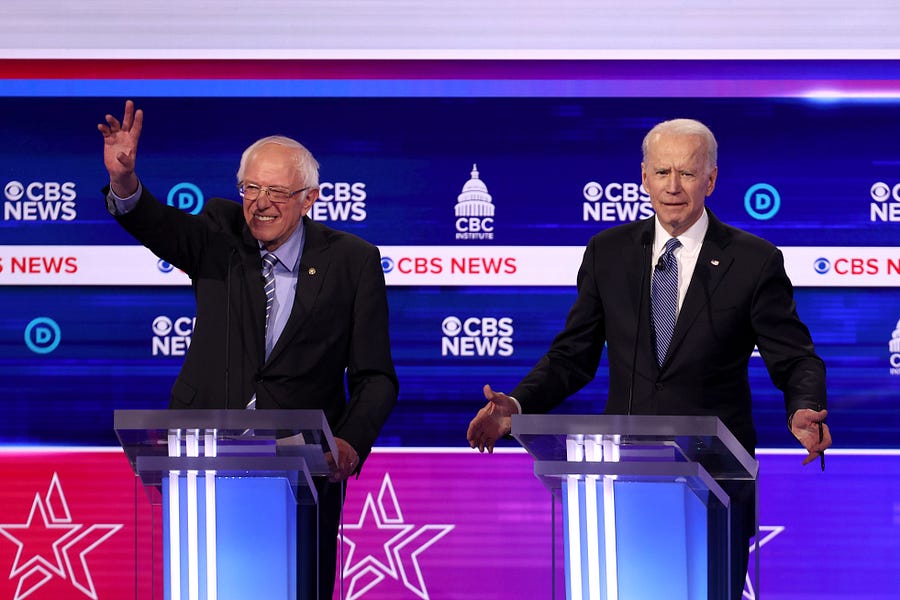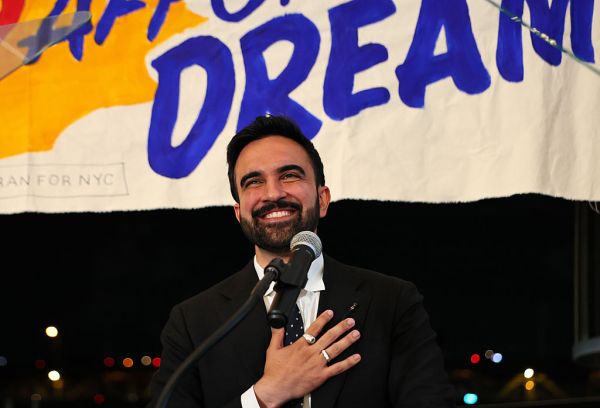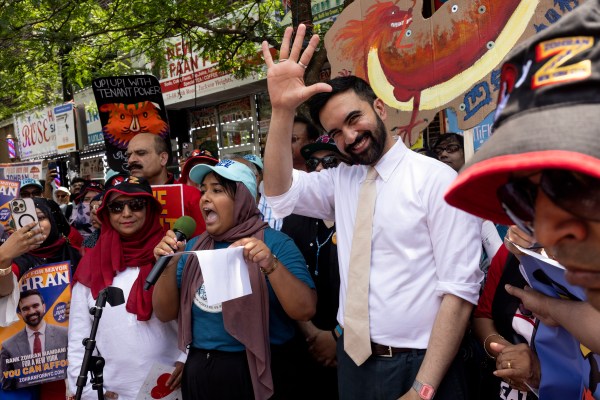In the wave of COVID-19 closures and cancellations, CNN announced that it was moving Sunday’s Democratic Primary debate between Joe Biden and Bernie Sanders—previously scheduled in Arizona—to its Washington, D.C., studios without a live audience. With almost all sporting events canceled for the foreseeable future, viewership may actually tick up.
That is bad news for Joe Biden and the Democratic Party.
Another round of big primaries are scheduled for Tuesday—Florida, Illinois, Arizona, and Ohio—with nearly 600 delegates at stake. Notably, three of those four are swing states that Democrats lost in 2016, along with a top tier Senate race in Arizona. Biden is currently forecasted to win them all, with the biggest margins in Florida—which also happens to have the most delegates up for grabs.
And Florida is particularly interesting. As Marc Caputo, longtime Florida political reporter, noted in Politico: “More than a quarter of the Democratic primary electorate is traditionally African American, Biden’s base. Two-thirds are typically 50 or older, also Biden’s stronghold. And about 60 percent in the polls consider themselves moderates or even conservatives—ditto, advantage Biden.” Even more devastating, Biden is winning Hispanics in that state by a whopping 34 percent after Sanders’ Castro-affectionate comments on 60 Minutes.
Why is all of this bad for Biden? Because Sanders has nothing left to lose, as they say.
In 2016, the primary dragged on until June despite every indication that Hillary Clinton would win the necessary number of delegates to become the nominee months earlier. Long primaries—even ones where the outcome is all but certain—cost money and focus that can’t be redirected to the general election fight. It means not redeploying staff to general election states. It means spending money on turnout operations and mailers. And it costs time, the most valuable resource of all.
But it also means the intraparty squabbling and attacks of a primary campaign continues. Sanders didn’t endorse Clinton until mid-July. And as the months went by, Sanders never backed off his attacks on Clinton as corrupt and untrustworthy.
In one such exchange ahead of their last debate in April, Sanders said, “When you voted for the war in Iraq, the most disastrous foreign policy blunder in the history of America, you might want to question your qualifications. When you voted for trade agreements that cost millions of Americans decent paying jobs, and the American people might want to wonder about your qualifications. When you’re spending an enormous amount of time raising money for your super PAC from some of the wealthiest people in this country, and from some of the most outrageous special interests … Are you qualified to be president of the United States when you’re raising millions of dollars from Wall Street whose greed and recklessness helped destroy our economy?”
Clinton herself blamed Sanders. His unrelenting attacks on her character, as Vanity Fair noted, “caused lasting damage, making it harder to unify progressives in the general election and paving the way for Trump’s ‘Crooked Hillary’ campaign.” The result? More than 12 million Obama voters from 2012 either voted for Trump or stayed home. That includes the 35,000 or so votes spread across Michigan and Wisconsin that helped provide Trump’s Electoral College victory—both states that Sanders had won in the primary.
A repeat of 2016 would be a nightmare scenario for the Democratic Party and the Biden campaign. Joe Biden currently has above a 99 percent chance of winning the majority of delegates according to FiveThirtyEight’s delegate projection model. He needs to revamp his entire campaign operation to focus on November—getting staff on the ground in Pennsylvania and Michigan and all the places the Clinton team neglected in 2016, for example.
But Biden’s biggest weaknesses within the party can still be weaponized against him as long as the primary continues. He’s not as progressive as the base would like, and he has a tendency to stumble over his words, leading to questions about his mental fitness for office. Debates offer Sanders an opportunity to highlight both and cast doubt about the presumptive nominee among the very people Democrats will need to win in November.
So why hasn’t the DNC pulled the debate altogether?
For the same reason then-President Obama advised Hillary to pull her punches against Sanders in 2016: fear of alienating his base. But he never delivered his base afterward, either. As Clinton wrote in her book, Sanders “didn’t get into the race to make sure a Democrat won the White House, he got in to disrupt the Democratic Party.”
But Sanders’s base isn’t as strong as it used to be. Fewer young voters are showing up to vote and his margins with those young voters is smaller as well. Polls show that his strong performance with Hispanic voters in California is shrinking in Arizona and reversed in Florida. The one area that Biden can’t give up on are the voters who say that recent economic gains have bypassed them. Sanders won those voters in the Texas and Minnesota primaries. They will be vital in the general election in states like Michigan and Pennsylvania for Biden.
So far, the Democratic Party appears to have learned quite a bit from the mistakes of 2016. But Sunday’s debate shows they have yet to figure out how to close the door on Bernie Sanders.
Photograph of Bernie Sanders and Joe Biden by Win McNamee/Getty Images.







Please note that we at The Dispatch hold ourselves, our work, and our commenters to a higher standard than other places on the internet. We welcome comments that foster genuine debate or discussion—including comments critical of us or our work—but responses that include ad hominem attacks on fellow Dispatch members or are intended to stoke fear and anger may be moderated.
With your membership, you only have the ability to comment on The Morning Dispatch articles. Consider upgrading to join the conversation everywhere.